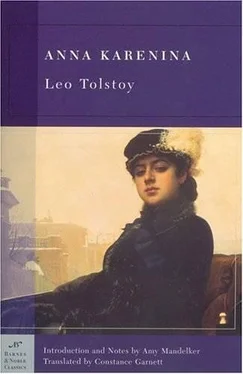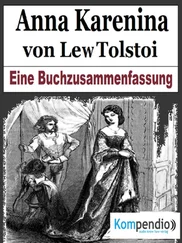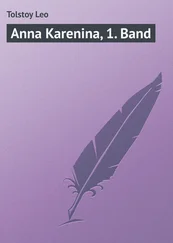"At the top, twelve and thirteen," the porter answered Levin's inquiry.
"At home?"
"Probably he is at home."
The door of No. 12 was half open, and, together with a streak of light, there issued thick fumes of cheap, poor tobacco, and the sound of a voice, unknown to Levin; but he knew at once that his brother was there: he recognized his cough.
As he went in at the door, the unknown voice was saying:
"It all depends with how much judgment and knowledge the thing's done."
Konstantin Levin looked in at the door, and saw that the speaker was a young man with an immense shock of hair, wearing a Russian coat, and that a pock-marked young woman in a woolen gown, without collar or cuffs, was sitting on the sofa. His brother was not to be seen. Konstantin felt a sharp pang at his heart at the thought of the strange company in which his brother spent his life. No one had heard him, and Konstantin, taking off his galoshes, listened to what the gentleman in the Russian coat was saying. He was speaking of some enterprise.
"Well, the devil flay them, these privileged classes," his brother's voice responded, with a cough. "Masha! get us some supper, and serve up some wine, if there's any left; or else send for some."
The woman rose, came out from behind the partition, and saw Konstantin.
"There's some gentleman here, Nikolai Dmitrievich," she said.
"Whom do you want?" said the voice of Nikolai Levin, angrily.
"It's I," answered Konstantin Levin, coming forward into the light.
"Who's I?" Nikolai's voice said again, still more angrily. He could be heard getting up hurriedly, stumbling against something, and Levin saw, facing him in the doorway, the big scared eyes, and the huge, gaunt, stooping figure of his brother, so familiar, and yet astonishing in its oddity and sickliness.
He was even thinner than three years before, when Konstantin Levin had seen him last. He was wearing a short coat, and his hands and big bones seemed huger than ever. His hair had grown thinner, the same straight mustache hid his lips, the same eyes gazed strangely and naively at his visitor.
"Ah, Kostia!" he exclaimed suddenly, recognizing his brother, and his eyes lighted up with joy. But the same second he looked round at the young man, and gave the nervous jerk of his head and neck that Konstantin knew so well, as if his cravat were choking him; and a quite different expression- wild, suffering and cruel- rested on his emaciated face.
"I wrote to you and Sergei Ivanovich both that I don't know you, and don't want to know you. What is it you want?"
He was not at all the same as Konstantin had been fancying him. The worst and most oppressive part of his character, which made all relations with him so difficult, had been forgotten by Konstantin Levin when he thought of him; and now, when he saw his face, and especially that nervous twitching of his head, he remembered it all.
"I didn't want to see you for anything," he answered timidly. "I've simply come to see you."
His brother's timidity obviously softened Nikolai. His lips twitched.
"Oh, so that's it?" he said. "Well, come in; sit down. Like some supper? Masha, bring supper for three. No, stop a minute. Do you know who this is?" he said, addressing his brother, and indicating the gentleman in the Russian coat: "This is Mr. Kritsky, a friend of my Kiev days- a very remarkable man. He's persecuted by the police, of course, since he's not a scoundrel."
And he surveyed, as it was a habit of his, everyone in the room. Seeing that the woman standing in the doorway was starting to go, he shouted to her. "Wait a minute, I said." And with that inability to express himself, the incoherence that Konstantin knew so well, he began, with another look round at everyone, to tell Kritsky's story to his brother: how he had been expelled from the university for starting a benevolent society for the poor students, and classes on Sunday, and how he had afterward been a teacher in a rural school, and had been driven out of that, too; and had afterward been on trial for something or other.
"You're of the Kiev University?" said Konstantin Levin to Kritsky, to break the awkward silence that followed.
"Yes- I was in Kiev," Kritsky replied angrily, his face darkening.
"And this woman," Nikolai Levin interrupted him, pointing to her, "is my lifemate, Marya Nikolaevna. I took her out of a dive, and he jerked his neck as he said it. "But I love her and respect her, and anyone who wants to know me," he added, raising his voice and knitting his brows, "is requested to love her and respect her. She's precisely the same as a wife to me- precisely. So now you know whom you've got to do with. And if you think you're lowering yourself- well, there's the door, and God speed thee!"
And again his eyes traveled inquiringly over all of them.
"But how will I lower myself? I don't understand."
"Then, Masha, tell them to bring supper; three portions, and vodka and wine… No, wait a minute… No, it doesn't matter… Go ahead."
"So you see," pursued Nikolai Levin, painfully wrinkling his forehead and twitching.
It was obviously difficult for him to think of what to say and do.
"Here, do you see?… He pointed to some sort of short iron bars, fastened together with twine, lying in a corner of the room. "Do you see that? That's the beginning of a new enterprise we're going into. This enterprise will be an industrial association…"
Konstantin scarcely heard him. He looked into his sickly, consumptive face, and he was more and more sorry for him, and he could not force himself to listen to what his brother was telling him about the association. He saw that this association was a mere anchor to save him from self-contempt. Nikolai Levin went on talking:
"You know that capital oppresses the worker. Our workers, the mouzhiks, bear all the burden of labor, and are so placed that, no matter how much they work, they can't escape from their position of beasts of burden. All the profits of labor, on which they might improve their position, and gain leisure for themselves, and after that education- all the surplus values, are taken from them by the capitalists. And society is so constituted that the harder they work, the greater the profit of the merchants and landowners, while they stay beasts of burden to the end. And that state of things must be changed," he finished up, and looked questioningly at his brother.
"Yes, of course," said Konstantin, looking at the patch of red that had come out on his brother's projecting cheekbones.
"And so we're founding a locksmiths' association, where all the production and profit, and the chief instruments of production- everything- will be in common."
"Where is the association to be?" asked Konstantin Levin.
"In the village of Vozdrem, government of Kazan."
"But why in a village? In the villages, I think, there is plenty of work as it is. Why a locksmiths' association in a village?"
"Why? Because the peasants are just as much slaves as they ever were, and that's why you and Sergei Ivanovich don't like people to try and get them out of their slavery," said Nikolai Levin, exasperated by the objection.
Konstantin Levin sighed, looking meanwhile about the cheerless and dirty room. This sigh seemed to exasperate Nikolai still more.
"I know Sergei Ivanovich's, and your, aristocratic views. I know that he applies all the power of his intellect to justify existing evils."
"I say, why do you talk of Sergei Ivanovich?" Levin let drop, smiling.
"Sergei Ivanovich? I'll tell you why!" Nikolai Levin shrieked suddenly at the name of Sergei Ivanovich. "I'll tell you why… But what's the use of talking? There's only one thing… What did you come to me for? You look down on all this; very well, then; but go away, in God's name- go away!" he shrieked, getting up from his chair. "Go away- go away!"
Читать дальше












